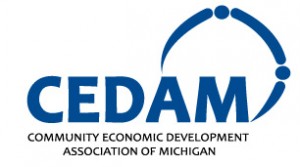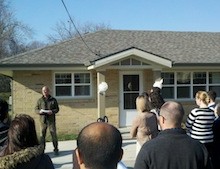Michigan Allocates $3.7 Million from National Mortgage Settlement to Housing and Community Development Fund

The State of Michigan allocated $3.7 million to the Michigan Housing and Community Development Fund as part of its National Mortgage Settlement award. Michigan Housing and Community Development Fund develops and coordinates public and private resources to meet the affordable housing needs of low income, very low income, and extremely low income households and to revitalize downtown areas in Michigan. The allocation was part of the Michigan Homeowner Protection Fund, established in September 2012, which directs the state’s settlement award to nine housing and foreclosure related initiatives.
The Michigan State Housing Development Authority (MSHDA), which administers the Housing and Community Development Fund, expects to make 10-15 awards with the settlement funds. Eligible activities include costs associated with the acquisition, rehabilitation, new construction, development, predevelopment, and operating or replacement reserves of rental housing; permanent supportive housing; and community development projects located in a downtown or adjacent neighborhood including but not limited to homeownership, housing rehabilitation, façade improvement, infrastructure improvement, economic development projects, in-fill new constructions, and community facilities. Eligible applicants for the funding include nonprofit and for-profit corporations, municipalities, Land Bank Fast Track Authorities organized under the Land Bank Fast Track Act, and partnerships or special purpose entities approved by MSHDA.
The Housing and Community Development Fund has three statutory earmarks: (1) Not less than 30% of the dollars used for loans or grants made in any program year shall be earmarked for projects that target extremely low income households and include at a minimum developing housing for the homeless, supportive housing, transitional housing, or permanent housing; (2) A portion of the fund shall be expended for housing for persons with physical or mental handicaps and persons living in “eligible distressed areas”; and (3) Not less than 25% of the dollars used for loans or grants made in any program year shall be earmarked for rental housing projects that do not qualify under preferences for special population groups, or other preferences contained in the allocation plan. The Michigan Legislature established the Housing and Community Development Fund in 1966 without a permanent funding source. Though the Fund has received periodic allocations of funding from the legislature over its history, it had not received new funding since 2008.
Following four years of zero funding, advocates in were thrilled with $3.7 million allocation. “The Fund is a proven tool in Michigan, and to have it zero funded when our communities needed it most has been tragic”, said Jamie Schriner Hooper, executive director of CEDAM (Community Economic Development Association of Michigan). “This recent period shows the peril of relying on budget deliberations to determine investment in housing and community infrastructure. While we are pleased that the Fund received settlement funds, we believe it is time for Michigan to dedicate an ongoing funding source to the Fund.”
Attorney General Bill Schuette, Governor Rick Snyder and the legislature worked together to establish the Michigan Homeowner Protection Fund in order to efficiently direct the Settlement funds to established housing and foreclosure programs, including the Housing and Community Development Fund. The key leader in the legislature was Senator Mark Jansen (R), a long time supporter of affordable housing, community development and the state fund. Jansen was intentionally high profile in his support, in order to encourage some of his fellow conservative colleagues to support investing in the Housing and Community Development Fund.
 CEDAM led the advocacy effort to build the necessary legislative support. CEDAM maintained close communication with Senator Jansen, while coordinating the legislative outreach and testimony of its members and allies. Needless to say, advocates and supporters were eager to be engaged in making the case for the Housing and Community Development Fund. The legislative strategy, however, required that CEDAM orchestrate a low key push, focused on likely supporters.
CEDAM led the advocacy effort to build the necessary legislative support. CEDAM maintained close communication with Senator Jansen, while coordinating the legislative outreach and testimony of its members and allies. Needless to say, advocates and supporters were eager to be engaged in making the case for the Housing and Community Development Fund. The legislative strategy, however, required that CEDAM orchestrate a low key push, focused on likely supporters.
“To successfully navigate this legislature, we needed to be strategic, and even at times restrained,” said Schriner-Hooper. “Having Senator Jansen in our corner was crucial. Before his service in the legislature, Senator Jansen actually worked for CEDAM, so he knows personally about the positive impact of public investment in housing and community development. We are very grateful for his leadership.”
The National Mortgage Settlement, approved on April 4, 2012, is the result of a state-federal agreement settling charges that the five largest loan servicers (Ally/GMAC, Bank of America, Citi, JPMorgan Chase, and Wells Fargo) engaged in improper servicing and foreclosure activities. Michigan received $97 million in a direct payment from the five mortgage servicers in the settlement, all of which was directed to the Michigan Homeowner Protection Fund. In addition to the Housing and Community Development Fund, other initiatives receiving allocations are Foreclosure Rescue Scam Victim Restitution ($7.5 million), Assistance for Veterans ($5 million), Michigan Attorney General Home Protection Unit ($6 million), Blight Elimination ($25 million), Foreclosure Counseling ($20 million), Grants to Help Homeowner refinance ($5 million), Assistance to Homebuyers ($15 million), and Education Achievement Authority ($10 million). Colorado, Kentucky, Nebraska, and Virginia have also dedicated National Mortgage Settlement funds to state and local housing trust funds.
Contact: Jamie Schriner-Hooper, Community Economic Development Association of Michigan (CEDAM), 1000 South Washington Avenue Suite 101, Lansing, MI 48910 (517) 485-3588 x 1940 or via the web at cedam.info.










